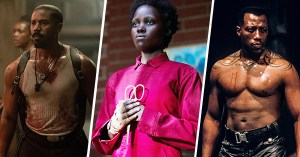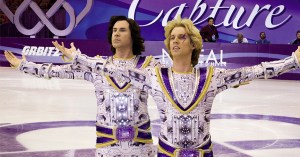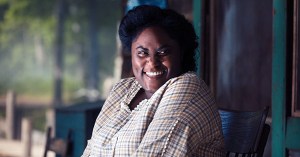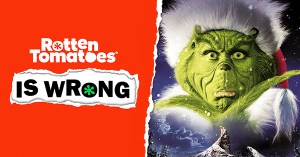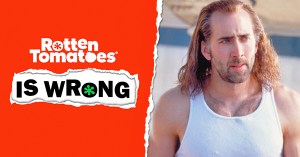Know Your Critic: Carolyn Hinds, Freelance Film Critic, Journalist, and Podcaster
Hinds celebrates her favorite releases of last year, spotlights recent films that have resonated with her, and explains why she doesn’t believe in “required viewing” (except when it comes to the Brandy Cinderella).
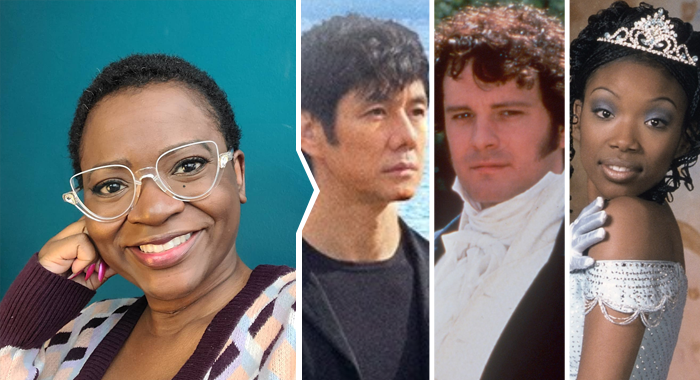
(Photo by Sideshow, Janus Films; BBC1 / Courtesy Everett Collection; Neal Preston / ©ABC / Courtesy Everett Collection)
“Know Your Critic” is a column in which we interview Tomatometer-approved critics about their screening and reviewing habits, pet peeves, and personal favorites.
Carolyn Hinds’ expertise runs the gamut from global cinema to period pieces to Korean television dramas. Her reviews, interviews, and podcasts promote visibility and conversation around major hits, critical darlings, and small releases that may otherwise fly under the radar. Her highly-engaged Twitter conversations, which often involve her live-tweeting screenings at home, are not to be missed.
In addition to writing movie and television reviews for several print and online outlets, Hinds also hosts three podcasts in the ButWhyTho? Network: “My podcasts are three completely different spectrums of entertainment: Here’s What Happened is the more nerdy stuff, then Carolyn Talks is where I get into these really in-depth discussions with film creatives, and for Beyond Romance, it’s just getting to geek out over Asian dramas and films,” Hinds shared in an interview with Rotten Tomatoes. “That’s something I never imagined that would’ve happened when I started.”
“I’m just so proud of being able to make it, push through, especially through all the illnesses and stuff that I’ve had to contend with and having multiple sclerosis, too – that’s such a challenge, and being able to just get up and do what I want to do and do something that I still very much love doing,” Hinds said. “I’m proud of me for that.”
Carolyn Hinds is a freelance film critic, journalist, and podcaster based in Toronto. Her reviews can be found at Mediaversity Reviews, Observer, and ButWhyTho?, among others. She is a member of the African American Film Critics Association. Find Carolyn on Twitter: @CarrieCnh12.
Do you have a favorite experience or memory from watching something in a theater?
I would have to say Black Panther, because I saw Black Panther in the cinema five times. The first time I saw it, I cried my eyes out for the last 10 minutes when he talked about the ancestors – I was bawling my eyes out. I was crying. … There was an event where everyone dressed up in traditional African wear or clothing in homage to the characters.
Then my sister and I met with our dad for a screening, and that was fun. That was, I think, the first time we ever went to the cinema with our dad as adults – every other time we went with our dad was as kids.
What was his reaction to the movie?
He loved it. My dad is a history buff and retired biochemist, but he’s also a published writer, too.
We had a lot of fun talking about the scenes in the film and the history and talking about Black excellence and education, that kind of stuff. But it was also one of the first times I really got to talk with my dad from the perspective of a film critic, too. That was fun.
We argued, but it was so fun.
When you are watching something at home, do you have a ritual that you go through, like “lights down, popcorn in my lap, ready to go?”
I have my popcorn, I have my drink, and I make sure I’m comfortable. I have my phone plugged in, because I live-tweet a lot of stuff – that’s kind of become a ritual for me, too.
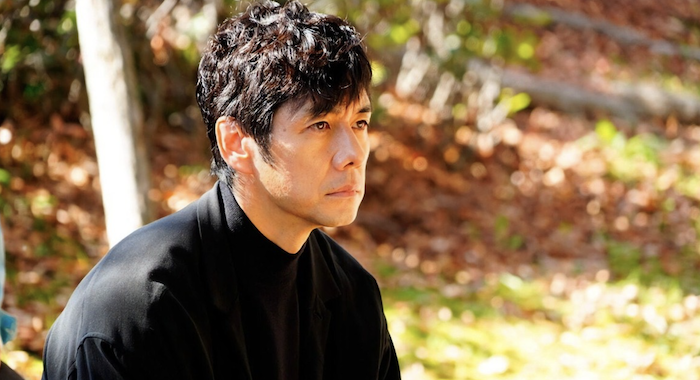
(Photo by Sideshow / Janus Films)
Oscar nominations were announced recently! Do you have a film or performer or writer or director that you’re rooting for?
I’m definitely rooting for Denzel Washington, Aunjanue Ellis, and Kodi Smit-McPhee. Benedict Cumberbatch is really good in The Power of the Dog, but I still believe he should have been nominated for his performance in The Electrical Life of Louis Wain. He gave a much more nuanced and powerful performance in that because it’s a more unique role.
Is there anyone that you think should have been nominated?
Hidetoshi Nishijima. He should have been nominated for his performance as Yusuke in Drive My Car. The reason I’m going to go with that is not only because he gives a fantastic performance and I’m familiar with him from watching other Japanese drama and films, but it boggles my mind that films can be nominated for Best Picture, Best International Feature Film, and the cast does not get nominated. That makes no sense.
What, for you, makes a good movie?
For me, a good movie is one that, whether or not it’s about people that I relate to – for instance, if it’s about Black people or if it’s about Asian people, white people, Southeast Asian – even if I don’t have personal connections to, the story and the acting is so well-crafted that I can understand these characters and I feel invested in the story.
An example would be The Power of the Dog. I think The Power of the Dog is such an expertly crafted film, and it has everything to do with the cinematography and the acting and the costume design. The way [Jane Campion] weaves the story, like the reveal of what Kodi’s character did – it was like, my god, the thread, the needles, the way she just dropped all of these little clues in the film.
Drive My Car is also one of my other favorite films. Because of the things that I went through personally, when I watch that film, I love how it discusses grief and how grief can be personal, but then it can be extrapolated to the people that we live around. Each person plays a part in the main character’s grief, only he doesn’t know. They’re narrators for his own idea of where he came from. It’s about how grief and personal accountability is a journey.
What were you watching the first time you saw yourself on screen, if you have seen yourself, and what did you relate to about that character or story?
I know a lot of people would talk about things they saw as kids. I grew up in Barbados, watching North American productions with Black kids, and I watched Caribbean productions with kids on shows and stuff, but, for me, it’s about “as an adult.”
Honestly, I’m going to mention it because I wrote a piece about it and it was probably the most vulnerable I’ve been in a piece for a while. Coming Home Again.
I saw that film at TIFF, and I was bawling my eyes out. It was 2019 and I had just recovered from a surgery. I had a lytic tumor removed from the skull of my head. I had a cranioplasty, which means I had part of my skull removed and replaced with a titanium plate.
That film, I had no idea what the film was about. I hadn’t read the story it was based on before. When it talked about cancer and finding connection to your family through food and culture, it touched me personally – not only because I had been terrified that a tumor that they found would’ve been cancerous, but it also made me think of my grandmother, who died of liver cancer. I was bawling my eyes out.
Every time I think about it – if you hear it in me – I get emotional every time I think about that film.
There’s a thread between Coming Home Again and Drive My Car, maybe a collective experience of grief?
Exactly… Drive My Car was the very first film I saw for 2022. I woke up January the first and I put on my screener for Drive My Car. Coming Home Again and Drive My Car, both films have a lot of meaning for me personally, with regards to my health, and they both discuss journey and grief and understanding where we come from and how grief shapes us as individuals and the people around us. I love both of those films so much for that.

(Photo by BBC1 / Courtesy Everett Collection)
What’s your favorite classic film?
It’s not a film, but it’s a series: I believe the Pride and Prejudice adaptation with Colin Firth is the best. I will argue to the ends of the earth about that. Matthew MacFayden, I love you, but Colin Firth was really Mr. Darcy for me.
My jaw is on the floor. I love this answer.
I will defend that to the end. I love Matthew MacFayden, but sorry, Colin Firth was hotter.
What do you think is the biggest misconception that people have about critics?
That we’re wealthy. [Laughs] Honestly! I’m just like, “People, don’t let this title fool you.” Unless you got a staff job, you’re struggling.
One of the other misconceptions is that so many people think that what white male critics have to say about films is what everyone has to say about films, but that’s extremely far from the truth. I think that it’s because white male credits get so much of the visibility in film criticism, even now. People think, “Oh, if this is what these particular set of critics are saying, that means this is what everyone is saying.”
That dominates and drives the path of the discussions for films from the beginning, and it starts at the festivals. You can see how the conversations start forming before 90% of the critic base even has a chance to see these films.
What motivates you as a critic?
I think it’s important that people get to see the different perspectives and opinions, and also experiences, that create the need for some criticism. I’m never expecting anyone and everyone to agree with me, with my opinions, in a review and interview, or even in my live tweet.
I just think it’s important that people realize, like, “OK, this person has a perspective that might be worth interrogating and considering.” To me, that’s the most important thing about film criticism. Just being honest and giving a perspective that other people may not have considered. As I said, you don’t have to agree with me, but just consider, “OK, you know what? I see your point. I see your perspective.”
Then, in talking to a lot of film creatives, I love the fact that I think so differently because a lot of directors and writers and the actors, they will tell me, “Oh, you’re the first person to pick up on this.”
My mom used to tell me when I was young, she’s like, “Carolyn, you know people say, ‘think outside box.’” She’s like, “For you, there is no box.” I just think about things so completely different to other people. I just love being able to interpret that with regards to film criticism. Just get it all out.
Do you have any advice for rising critics who are still finding their voice?
Write from the perspective that is your own natural voice, because that’s something that I had to learn when I started.
Literally, the way I write is the way I speak. That’s my best advice: Write in the way that comes naturally to you – whichever type of voice you have, use that. Because we all can’t write the same and we all don’t think the same, so criticisms shouldn’t all be the same. Right?
Who are three people that everyone should follow on Twitter?
Rebecca Theodore-Vachon (@FilmFatale_NYC). I love Rebecca’s thoughts and the way she thinks.
I would always encourage people to follow actors. There’s a guy that I started interacting with last year, Edward Hong (@CinnabonMonster). He’s a voice actor and he talks about the challenges of voice acting in Hollywood in particular, especially as a person of color, because he’s Asian.
Another person that I would recommend people follow is Jess Vũ (@jesthevu). She works with CAPE (Coalition of Asian Pacifics in Entertainment). They work with representation for Asians and Asian spaces and they help with promoting films by Asian creatives – not just the big films, but the small projects by Asian creatives and from all over Asia.
Is there someone in your life who is not a critic whose opinion you admire and you seek out on movies?
My twin sister, Charlene. When it comes to talking about films and TV shows, we just sit down and we talk about everything and she understands me – then we also argue. When you’re a twin, your twin is the one person that really gets you and also the one person that will really get on your nerves.
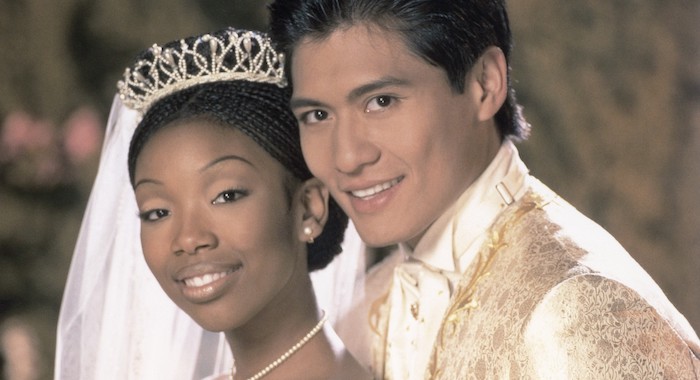
(Photo by Neal Preston / ©ABC / Courtesy Everett Collection)
Do you have a favorite film from your childhood?
Can I make it a tie? The Lion King and Mulan.
I know all the songs. The nostalgia. That’s when Disney was really Disney, and the nostalgia of those films: The Lion King, Mulan, Hercules, The Little Mermaid – she’s problematic, but the songs are all bangers. Come on, Ariel, you don’t know this man! You gave your fin for a guy you just saw on a ship? Come on, girl.
Then I would also have to go with – I call it, we call it – “the Brandy Cinderella.” That is the quintessential Cinderella story! That is my Cinderella story. Brandy [Norwood] and Paolo Montalban. Come on now, that era of film, that era in the nineties!
I mean, speaking of hot actors… Brandy and Paolo…
Can’t beat that! Come on. When you talk about truly diverse casting, that film right there is the example. If you want to talk about “color-blind casting,” that film is the example and the level that we all should be aspiring to. Not to mention the fantastic costume designs, because I wanted those gowns! I did.
What do you consider “required viewing?” Do you believe in required viewing?
No, not really. I don’t believe in required watching, but what I do is, if people ask me for recommendations, I like to give recommendations in different genres. I believe in watching films from around the world and from different eras.
I would say Cinderella – Brandy’s Cinderella – is, yes, you should watch that. If I had to, put a gun to my head, pull my hand behind my back, I’d be like, okay, if I must. Because it’s perfect.
Carolyn Hinds is a freelance film critic, journalist, and podcaster based in Toronto. Her reviews can be found at Mediaversity Reviews, Observer, and ButWhyTho?, among others. She is a member of the African American Film Critics Association. Find Carolyn on Twitter: @CarrieCnh12.


